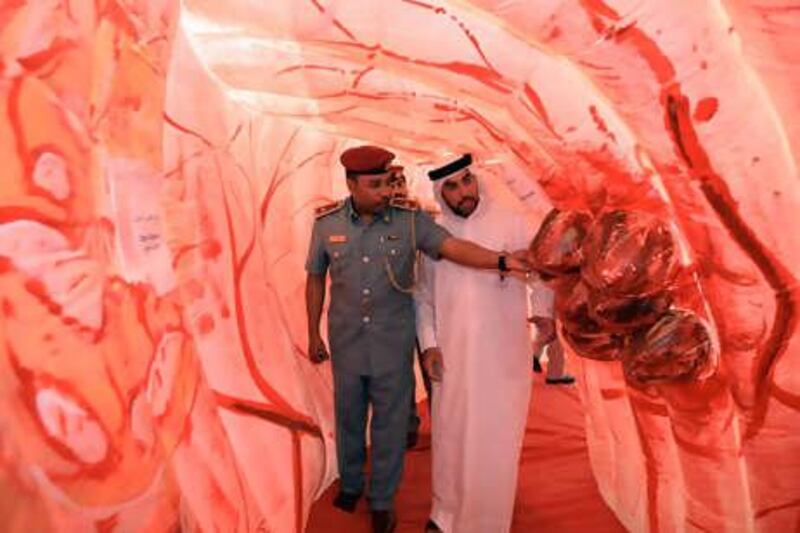ABU DHABI // Mandatory colonoscopies could be introduced for all Emiratis in an effort to cut deaths from colorectal cancer. A pilot scheme, launched yesterday at the Bani Yas Health Centre in Wathba, will screen some 15,000 nationals aged between 50 and 75 by the end of this year. The Health Authority-Abu Dhabi (HAAD) will then assess the feasibility of screening the entire Emirati population. It would be the emirate's second mandatory cancer screening programme. Since last year, all Emirati women older than 40 have been required to be screened for breast cancer in order to renew their Thiqa health insurance cards.
Zaid al Siksek, the chief executive of HAAD, said "Colorectal cancer, also known as bowel cancer, is the fourth most frequent cancer in women and the third in men, in the emirate of Abu Dhabi. "It constitutes nine per cent of all cancer cases in the country and affects five in 100,000 new people each year, but early detection can lead to full recovery in 90 per cent of the cases." The pilot scheme will consider how frequent screening should be carried out. Some medical professionals recommend that individuals undergo screening evey five years, while others say once a decade is optimal.
Dr Salim Adib, manager of public health at HAAD, said countries differ in what they consider to be effective early detection procedures. "There are tests that can be done, including a faecal immunological test that searches for hidden blood in stools which is not apparent to the naked eye. "Based on the effectiveness of these test, we might not have to cause patients stress and discomfort by asking them to undergo endoscopies every five years." The targeted group at at the Bani Yas Health Centre, all of whom are asymptomatic, healthy UAE nationals who will be offered the test for free, will initially be given stool tests. Those whose tests come back positive will be referred for a colonoscopy-biopsy at Mafraq Hospital.
The incidence of bowel cancer is on the increase in the UAE, and is the fourth most common type of the disease after breast cancer, leukaemia and cancer of the lymph nodes. Some 50 new cases are diagnosed every year in the capital alone. Dr al Rahmani said that in the US, five per cent of the population will develop bowel cancer in their lifetime, which is at least 10 times higher than the rate of incidence in the UAE. However, the survival rate in the US is much higher. Bowel cancer, he said, is the only cancer that has a precancerous stage that can be detected and removed before cancer sets in. If detected early, it can be removed with a simple endoscopy. If found later, surgery and radiation therapy are required.
"That is what we want to get to through this pilot screening; we want to detect early so that we can also have a high survival rate." Although the incidence is lower in the UAE, Dr Adib said, the risk factors are present. "We have an ageing population, whose diet is high in fat and low in fibre, and these are risk factors," he said. Dr Emad al Rahmani, chair of medicine at Mafraq Hospital, said patients do not shy away from colonoscopies as much as they used to. "In the past two years that I have been working in this country, seeing this subject as a taboo is a myth," he said.
"Not a single patient, male or female, that I have advised to be screened because they may be at high risk has declined. It is a matter of education, of spreading the word, and of saving lives." @Email:hkhalaf@thenational.ae
? Bowel cancer - which can affect the colon or rectum, or both - can strike both men and women, and is most common in men 50 and older. ? A family history of bowel cancer increases the risk of contracting the disease. ? It is preventable if diagnosed and treated early, and curable in 90 per cent of cases if spotted early. ? It accounts for nine per cent of cancer cases in the UAE. ? It is the third most common type of cancer among males in the UAE, and the fourth most common among women. ? According to the World Health Oganisation, bowel cancer is the second most commonly reported cancer in Europe, where 400,000 people are diagnosed annually. ? It is the third most commonly reported cancer in the world, affecting one million people each year. ? Regular screenings are advised, as well as a low-fat diet rich in fruits, vegetable and whole grains. * The National





